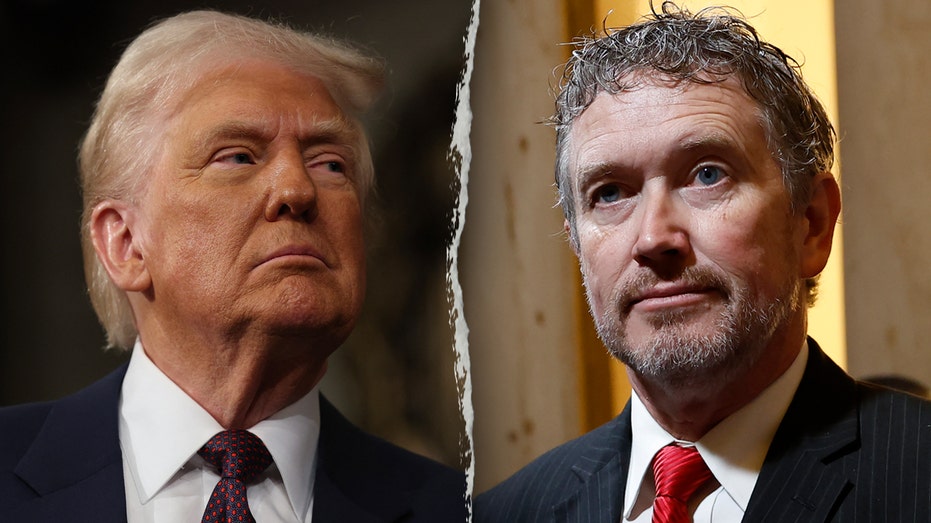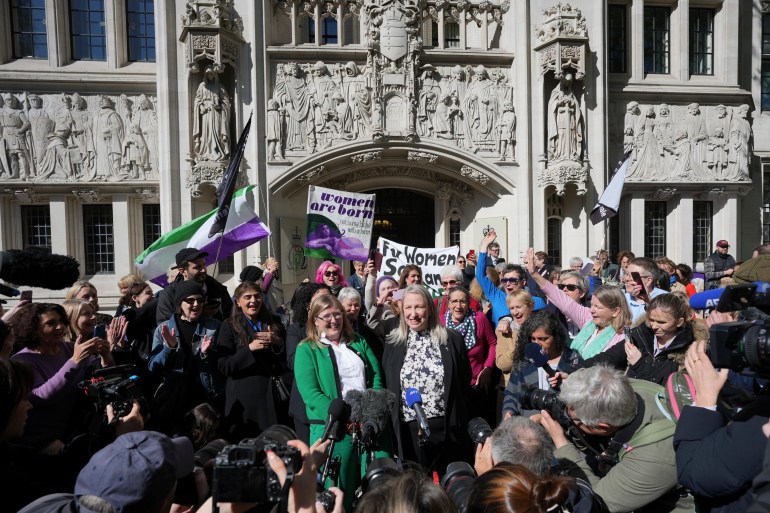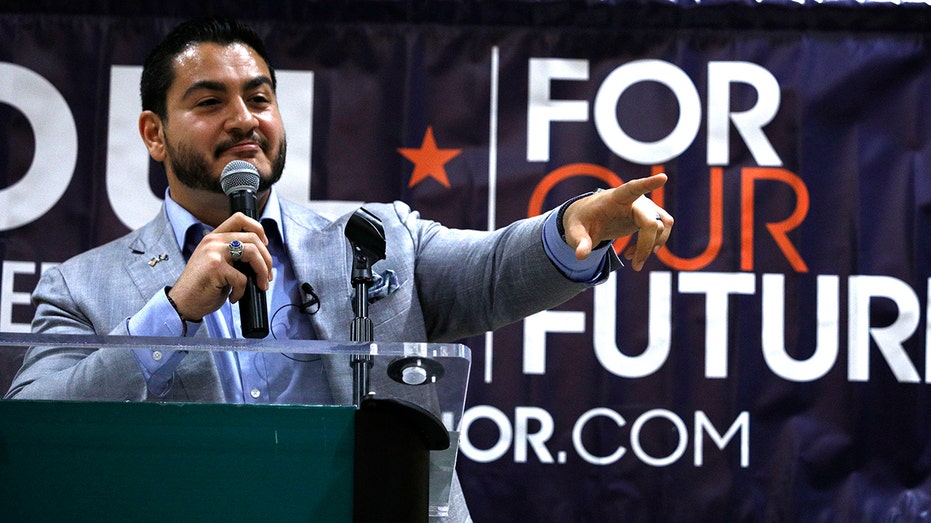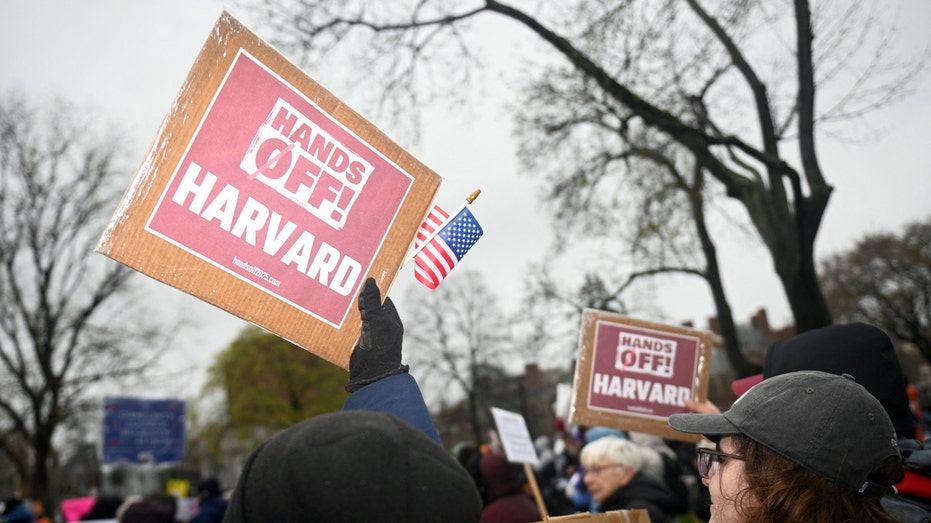‘Mass surveillance’: Conservatives sound alarm over Trump admin’s REAL ID rollout

Conservatives are speaking out against the Trump administration’s plans to finally enact long-expected REAL ID laws in a bid to crack down on illegal immigration. “If you think REAL ID is about election integrity, you’re going to be sorely disappointed. Someone has lied to you, or you’re engaged in wishful thinking. Please don’t shoot the messenger,” Rep. Thomas Massie, R-Ky., wrote on X earlier this week. Responding to Department of Homeland Security (DHS) Secretary Kristi Noem’s video announcing the May 7 REAL ID deadline, the former vice presidential candidate and Alaska Gov. Sarah Palin questioned in a lengthy post: “Or what?? Evidently, existing ID requirements for American citizens just aren’t adequate now, so Big Brother is forcing us through more hoops for the ‘right’ to travel within our own country.” Palin continued: “Other administrations delayed this newfangled, burdensome REAL ID requirement. Are you curious why its implementation is imperative now?? And who came up with this?” NO ‘REAL ID’ APPOINTMENTS OPEN IN NEW JERSEY AS RESIDENTS SOUND OFF: ‘GET WITH THE TIMES, NJ’ The REAL ID Act was passed in 2005, but the federal government has yet to implement it 20 years later. It requires all U.S. travelers to be REAL ID compliant when boarding domestic flights. The Transportation Security Administration (TSA) announced last week that REAL ID would go into effect May 7, and that no other state-issued ID cards would be accepted for air travel. TSA senior official Adam Stahl said in the announcement that REAL ID “bolsters safety by making fraudulent IDs harder to forge, thwarting criminals and terrorists.” While an overwhelming majority of Republicans appear to have few issues with the change, some on the right have cried foul. Massie argued in an X post, “As long as the pilot’s door is locked and no one has weapons, why do you care that someone who flies has government permission? REAL ID provides no benefit, yet presents a serious risk to freedom. If a person can’t be trusted to fly without weapons, why are they roaming free?” REAL ID DEADLINE FOR TRAVELERS, SOME FEDERAL BUILDING ACCESS QUICKLY APPROACHING Massie targeted President Donald Trump more directly in response to another X user who asked whether he was opposed simply because of his differences with the commander in chief. The Kentucky Republican has been known for multiple public spats with Trump. “REAL ID is a 2005 George Bush-era Patriot Act overreach that went completely unenforced until Trump got into office. Let me guess: he’s playing 4D chess and I should just go along with it?” Massie wrote. Former presidential candidate and ex-House Rep. Ron Paul, R-Texas, wrote on X, “Homeland Security chief Kristi Noem announced Friday that the notorious PATRIOT Act-era REAL ID scheme would go into effect at the end of the month. REAL ID is one of the greatest threats to Americans’ civil liberties in decades.” Kentucky state Rep. TJ Roberts, a Republican, agreed with Paul on social media, writing, “Repeal REAL ID!!” New Hampshire state Rep. Joe Alexander, a Republican, added on the accusations, calling REAL ID a “violation of the 14th Amendment of the US Constitution,” and writing, “the Federal Government should not be mandating ID for its citizens to travel between states. Just say NO.” Cato Institute senior fellow Patrick Eddington told Fox News Digital, “I’m not aware of a single post-9/11 instance of an alleged or actual terrorist being apprehended, much less successfully boarding an airliner, with false ID credentials – which is the entire-stated rationale for REAL ID.” Eddington argued it imposed unconstitutional burdens on people who are seeking to travel by air versus train. “If you got word that your mother had just had a stroke and her prognosis was uncertain, and you wanted to quickly fly home to be with her but couldn’t because you didn’t have a REAL ID-compliant ID card, that would be one very real-world example of a tangible harm this insane law could cause on literally a daily basis,” he said. “The REAL ID Act effectively institutes a form of mass surveillance and verification that doesn’t discriminate between those who have given reason for suspicion and those who haven’t, which is why it should never have been enacted in the first place.” Meanwhile, Trump ally Rep. Mark Alford, R-Mo., targeted critics in his own public statement. “The REAL ID Act was passed way back in 2005, 20 years ago!!!! It’s about time everyone stop dragging their feet. Quit scrolling through social media, quit complaining, get your info together, and get down to the DMV to get your REAL ID,” Alford said Wednesday. The DHS has argued that implementing REAL ID now will help the Trump administration further its goals in cracking down on illegal immigration. A DHS memo obtained by Fox News Digital earlier this week argued in favor of its implementation, that REAL ID “closes the gaping vulnerabilities Biden’s policies created, preventing criminals and potential terrorists from exploiting our aviation system, as seen during 9/11 when fraudulent IDs enabled attacks.” Trump administration allies have also pointed out that it is carrying out a directive by Congress that’s long been stalled, but that the current White House took no part in deciding. Fox News Digital reached out to the White House and TSA for further comment. Massie’s spokesman said he was not available for an interview when reached by Fox News Digital. Fox News Digital’s Cameron Arcand contributed to this report.
Trump says Fed Chair Powell’s exit ‘can’t come soon enough’

United States President Donald Trump has hinted at firing Federal Reserve chairman Jerome Powell amid the president’s frustration that the central bank will not aggressively cut interest rates. On Thursday, Trump said that Powell’s “termination cannot come fast enough”. Powell’s term does not expire until May 2026. The president does not have the authority to remove Powell from the central bank. Trump’s attacks on Powell come after the Fed chair’s speech at the Economic Club of Chicago on Wednesday. Powell said the Fed would base its decisions solely on what is best for all Americans. “That’s the only thing we’re ever going to do,” Powell said. “We’re never going to be influenced by any political pressure. People can say whatever they want. That’s fine, that’s not a problem. But we will do what we do strictly without consideration of political or any other extraneous factors. “Our independence is a matter of law,” Powell continued. “We’re not removable except for cause. We serve very long terms, seemingly endless terms.” Advertisement The Republican president’s broadside comes a day after Powell signalled that the Fed would keep its key interest rate unchanged, while it seeks “greater clarity” on the effect of policy changes in areas such as immigration, taxation, regulation and tariffs. Powell also reiterated that Trump’s tariffs would likely raise inflation and slow the economy, which could make it harder for the Fed to cut rates anytime soon. The Fed chair suggested that the central bank would focus on fighting inflation in the wake of the tariffs, even if the duties did weaken the economy. Powell’s comments contributed to a drop in stock prices on Wednesday. Trump pushes back Pushing back on Powell, Trump in a social media post said, “Oil prices are down, groceries (even eggs!) are down, and the USA is getting RICH ON TARIFFS.” On the contrary, oil prices have risen 2 percent in the last two weeks. Grocery prices have actually increased under Trump, according to the most recent consumer price index report in April, and egg prices hit record highs last month as per the same report. Last week, the president falsely claimed the US brought in $2bn a day thanks to tariffs – it was $200m a day. Referring to the European Central Bank (ECB), Trump added that Powell “should have lowered Interest Rates, like the ECB, long ago, but he should certainly lower them now. Powell’s termination cannot come fast enough!” The ECB on Thursday lowered its key interest rate from 2.5 percent to 2.25 percent. Powell was initially nominated by Trump in 2017 and was appointed to another four-year term by former President Joe Biden in 2022. At a November news conference, Powell indicated he would not step down if Trump asked him to resign, pointing out that removal or demotion of top Fed officials was “not permitted under the law”. Advertisement Trump’s comments come with the backdrop of a legal case at the Supreme Court that could determine whether presidents can fire the heads of independent agencies such as the Fed. The case stems from Trump’s firings of officials from two independent agencies. The Supreme Court last week let the firings stand while it considers the case. It could issue a broader ruling this summer that would enable the president to fire Fed officials, including the chair. Powell said the Fed is watching the case closely, adding it might not apply to the Fed. Lawyers for the Trump administration have argued that allowing the president to fire the two officials wouldn’t erode the Fed’s independence. “It is difficult to overstate the consequences at this stressed moment of a Court ruling that found that President Trump … does have the authority to dismiss the heads of independent agencies and did not establish a clear carve-out for the Fed,” Krishna Guha, an analyst at investment bank Evercore ISI, wrote on Thursday. “If you liked the tariff debacle in markets, you’d love the loss-of-Fed-independence trade.” Tariff mayhem Powell started Trump’s second term in a relatively secure spot with a low unemployment rate and inflation progressing closer to the Fed’s 2 percent target, conditions that could have spared the US central banker from the president’s vitriol. But Trump’s aggressive and haphazard tariffs have raised the threat of a recession with both higher inflationary pressures and slower growth, a tough spot for Powell, whose mandate is to stabilise prices and maximise employment. With the economy weakening because of Trump’s choices, the president appears to be looking to pin the blame on Powell. Advertisement Trump has unleashed a rash of tariffs that have put the US economy and the Fed in an increasingly perilous spot. On April 2, the president rolled out aggressive tariff hikes based on US trade deficits with other nations, causing a financial market backlash that almost immediately led him to announce a 90-day pause in which most countries would be charged a baseline 10 percent tariff while negotiations go forward. But Trump increased his tariff hikes on China to a rate of 145 percent in addition to his existing tariffs on Canada, Mexico, autos and steel and aluminium. Wall Street banks such as Goldman Sachs have raised their odds that a recession could start. Consumers are increasingly pessimistic in surveys about their job prospects and fearful that inflation would shoot up as the cost of the import taxes get passed along to them. The risk of stagflation – stagnant growth and high inflation – would make it harder for the Fed to respond with the same playbook as recent downturns. The Budget Lab at Yale University estimated that the increased inflationary pressures from the tariffs would be equal to the loss of $4,900 in an average US household. Adblock test (Why?)
Trans women aren’t legally women: What the UK Supreme Court ruling means

The United Kingdom’s Supreme Court has ruled that the terms “woman” and “sex” refer to a “biological woman and biological sex” under UK equality laws, bringing a long-running court battle between feminist groups and the government of Scotland to an end. Wednesday’s ruling is expected to have far-reaching consequences for policies on whether and how spaces and services reserved for women should be extended to include “trans women” – those born male who have transitioned socially or medically or who identify as women – such as changing rooms, domestic violence shelters and medical services. Although the case originally began in Scotland, the court’s interpretation of the law will be effective across the UK, including in England and Wales. Reactions towards the ruling have been mixed: Feminist advocacy groups involved in the legal case have voiced satisfaction, while trans groups and some members of the Scottish government expressed disappointment and fear about future discrimination. Here’s what we know about the Supreme Court’s ruling and how the case started: Marion Calder and Susan Smith from For Women Scotland celebrate outside the Supreme Court to challenge gender recognition laws, in London, UK, Wednesday, April 16, 2025 [Kin Cheung/AP] What was the case about and how did it start? The legal dispute began in March 2018 when the Scottish Parliament passed an act stating that 50 percent of non-executive members of the boards of Scottish public bodies must be women. Advertisement The act, which is known as Holyrood’s Gender Representation on Public Boards (Scotland) Act 2018, was supposed to ensure better representation for women in public bodies. A sticking point in the policy, however, was the definition of “woman”. The act itself said that “women” included transgender women who held gender recognition certificates (GRCs) – that is, trans women who have legally transitioned and are certified by the government as having changed their gender. A feminist group, For Women Scotland (FWS), challenged the new law and launched a petition against it in 2018. The group argued that the Scottish parliament had wrongfully defined “woman” and that the law had failed to use legal definitions as set out in the UK Equality Act of 2010. That Act prohibits discrimination based on age, disability, gender reassignment, marriage or civil partnership (in cases of employment), pregnancy and maternity, race, religion or belief, sex, and sexual orientation. However, the UK Equality Act 2010 does allow for separate or single-sex services to be provided when this is reasonably necessary, such as for reasons of privacy, decency or preventing trauma. A Scottish court dismissed the first case brought by FWS in 2022, concluding that the Scottish legislation did not necessarily redefine “woman” by including transgender women. The judge ruled that women were “not limited to biological or birth sex”. FWS launched an unsuccessful appeal in 2023. The case was then heard at the Scottish Court of Session several times as the group sought to clarify how to correctly interpret the term “woman” as enshrined in the Equality Act. Advertisement In March 2024, the advocacy group, backed by other feminist organisations and lesbian groups, appealed to the Supreme Court. The group was also supported by Harry Potter author and women’s rights campaigner JK Rowling, who reportedly donated 70,000 pounds ($92,000) to a crowdfunding campaign by FWS. The rainbow flag, bottom right, a symbol of the lesbian, gay, bisexual, and transgender community, flies alongside the UK, left, and the Scottish flags over the UK government’s Scotland Office building, in central London, Friday, March 28, 2014 [Lefteris Pitarakis/AP] What did the Supreme Court decide, and how does the UK law define ‘woman’? On Wednesday, five judges ruled unanimously that the term “woman” in the existing UK Equality Act should be interpreted as only people born biologically female, and that trans women, even those with GRCs, should be excluded from that definition. The ruling further clarified, therefore, that trans women can be excluded from certain single-sex spaces and groups designated for women, such as changing rooms, homeless and domestic violence shelters, swimming areas and medical or counselling services. “Interpreting ‘sex’ as certificated sex would cut across the definitions of ‘man’ and ‘woman’ … and, thus, the protected characteristic of sex, in an incoherent way,” Justice Patrick Hodge said while summarising the case. “It would create heterogeneous groupings.” The court added that the ruling was not a “triumph” of one side over the other, and emphasised that transgender people are still protected from discrimination under UK law. However, some protections, the judges clarified, should only apply to biological females and not transgender women. Transgender rights supporters protest in favour of Scottish gender reform bill outside Downing Street in London, UK, January 17, 2023 [Henry Nicholls/Reuters] What are the broader implications? Until now, trans women with GRCs could be counted as women for the purpose of all-women shortlists for political parties or to fill quotas for women on boards or within organisations. This will no longer be the case. Advertisement In the 20 years since the Gender Recognition Act was passed in the UK, nearly 8,500 GRCs have been issued. The Gender Recognition Panel received 1,397 applications for GRCs in 2023-2024 – a record number. Of those, 1,088 were granted. This was triple the number of applications in 2020-2021, after which the application fee dropped from 140 to 5 pounds ($180 to $7). The ruling provides some clarification on an issue that has proved polarising not only in the UK but also in the United States. Debates have raged in both countries, as well as in other Western nations, on whether certain women’s rights, services or spaces should be extended to trans women. US President Donald Trump is facing legal challenges for signing orders to define sex as only male or female. Trump has also tried to ban transgender people from entering the military and block trans people from participating in sports teams that do not align with their biological sex. It’s unclear how the ruling could affect sport in the UK, but trans women
Haiti in ‘free fall’ as violence escalates, rights group warns

The security situation in Haiti is in “free fall”, Human Rights Watch (HRW) has warned, as armed groups continue to unleash deadly violence in the capital and other areas across the Caribbean nation. In a statement on Thursday, HRW said criminal gangs have escalated their attacks in Port-au-Prince since late last year, and only 10 percent of the city remains under government control. “Haiti’s security situation is in a free fall and Haitians are suffering horrific abuses,” said Nathalye Cotrino, the rights group’s senior Americas researcher. The country has reeled from years of violence as powerful armed groups, often with ties to the country’s political and business leaders, have vied for influence and control of territory. But the situation worsened dramatically after the July 2021 assassination of Haitian President Jovenel Moise, which created a power vacuum. Haitian security forces patrol during a protest against insecurity in Port-au-Prince on April 16, 2025 [Fildor Pq Egeder/Reuters] In 2024, the gangs launched attacks on prisons and other state institutions across Port-au-Prince, fuelling a renewed political crisis. Advertisement The campaign of violence led to the resignation of Haiti’s unelected prime minister, the creation of a transitional presidential council, and the deployment of a United Nations-backed, multinational police mission. That Kenya-led police force – formally known as the Multinational Security Support Mission (MSS) – has failed to take control back from the gangs, however. Observers say the mission has been underfunded and ill-equipped. Recently, so-called “self-defence” groups have formed in response to the armed gangs, leading to more deadly violence. Protests have also broken out in Port-au-Prince against the country’s transitional presidential council, which has been unable to restore security. On April 7, the authorities declared a new, one-month state of emergency amid the violence. “Declaring emergencies without equipping police with necessary resources, like effective armored vehicles, will not solve the insecurity crisis,” the National Human Rights Defense Network, a leading Haitian rights group, said in a recent report. “The absence of state response has turned the police into firefighters—constantly reacting without strategic direction—while towns fall one after another,” the group said. People walk past a burning barricade during a protest against insecurity in Port-au-Prince on April 16, 2025 [Fildor Pq Egeder/Reuters] ‘Why is no one helping us?’ According to UN figures, at least 1,518 people were killed and another 572 were injured between January 1 and March 27 in gang attacks, security force operations, and acts of violence committed by the “self-defence” groups and others. Advertisement Speaking to HRW, an aid worker in Haiti said people “no longer have a safe place” to go. “Women … seeking help have not only lost loved ones, but have also been raped, displaced and left on the streets, starving and struggling to survive. We don’t know how much longer they can endure such suffering,” the aid worker said. “All [victims] ask is for the violence to stop. With no support from the police or government, they feel abandoned. They ask, ‘Why is no one helping us? Why do Haitian lives not matter if we are human too?’” The UN also says more than 1 million Haitians have been displaced by the violence, while half of the country – some 5.5 million people – face acute food insecurity. In early April, Save the Children reported that more than 40,000 children were among those displaced in the first three months of 2025. “Children in Haiti are trapped in a nightmare,” the group’s Haiti country director, Chantal Sylvie Imbeault, said in a statement. “They are living in deadly areas controlled by armed groups, being robbed of a normal childhood, and at constant risk of recruitment—while humanitarian aid struggles to reach them,” she said. “As displacement continues to soar, shelters are becoming completely overcrowded, leaving children vulnerable to disease, exploitation, and sexual violence.” Adblock test (Why?)
Fierce Israel critic launches Senate bid in Michigan high-stakes 2026 midterm race

A former Michigan public health official and Democratic candidate for governor entered the race for the state’s open U.S. Senate seat on Thursday in what could be one of the most watched races in the 2026 midterm elections. Abdul El-Sayed, 40, is the second Democrat to put his name in the running to replace Democratic Sen. Gary Peters, who is not seeking reelection. El-Sayed, a prominent figure in a movement that was highly critical of support for Israel in the 2024 election cycle, aims to set himself apart from the other Democratic candidates in the race to replace Peters, state Sen. Mallory McMorrow. McMorrow has said she would vote against Senate Majority Leader Chuck Schumer, D-N.Y., retaining his leadership position should she prevail in the primary and general election to represent the battleground state in the upper chamber of Congress. However, El-Sayed held back criticism of Schumer. “Anybody who tells you that they’re going to unilaterally oppose one potential candidate without knowing who the alternative is, is either unnuanced or unsophisticated,” El-Sayed told Politico. “So I want to know who is available, who is actively seeking the leadership. I’ll make a decision from there.” GRETCHEN WHITMER RIBBED ONLINE FOR SEEMING TO HIDE FACE IN OVAL OFFICE “What we need right now is somebody who’s willing to take the fight directly to Trump and Musk, but then also knows how to rebuild a version of our federal government that better serves working people after the carnage that Musk and Trump are going to leave behind, and I think I offer that,” he told Politico. Other Democrats considering a run to replace Peters include U.S. Rep. Haley Stevens and Michigan Attorney General Dana Nessel. El-Sayed was active in the “uncommited movement,” a group of anti-Israel, traditionally Democratic voters in Michigan, a critical swing state, who threatened to withhold support from then-President Joe Biden, and then then-Vice President Kamala Harris, over the administration’s stance on Gaza. He did say he would back whoever was the eventual Democratic choice for the presidential ticket to oppose now-President Donald Trump, according to Politico. The Israel-Hamas war exposed deep divisions within the Democratic Party last election cycle, and there is concern the conflict could again make for a messy Senate Democratic primary in Michigan if the American Israel Public Affairs Committee intervenes. The powerful pro-Israel lobby group financially backed Stevens in 2022, when redistricting forced a competitive primary run against fellow Democrat, Rep. Andy Levin. “Everybody is unified around leadership that reminds the Democratic Party that we ought to be the party of peace and justice, that we ought not to be the party sending bombs and money to foreign militaries to drop bombs on other people’s kids in their schools and their hospitals, when our kids need more, our hospitals and schools need more, and we should be spending that money here at home,” El-Sayed told Politico. FIRST ON FOX: REPUBLICAN LAUNCHES SECOND STRAIGHT BID TO FLIP DEMOCRAT-HELD SENATE SEAT IN KEY BATTLEGROUND El-Sayed ran for governor in 2018 as a progressive Democrat and was endorsed by Sen. Bernie Sanders, I-Vt., and Rep. Alexandria Ocasio-Cortez, D-N.Y. He came in second in the Democratic primary, losing to Gretchen Whitmer by more than 20 points and beating now-U.S. Rep. Shri Thanedar by more than 12 points. Whitmer went on to win the general election and is in the midst of a second term. She cannot run again because of term limits. A resident of Ann Arbor, El-Sayed recently served as director of the Department of Health, Human and Veterans Services in Wayne County, home to Detroit. Before that, he was the public health director of the city after it declared bankruptcy in 2013. El-Sayed cautioned Democrats against learning the “wrong lessons” from their defeats. “If you cut corners and trim your message, and you triangulate to the least common denominator, you can find something that’s perfectly inoffensive to everyone, and the problem with that is that you’re not actually saying anything,” he told Politico. El-Sayed said he met with the Democratic Senatorial Campaign Committee on Tuesday. He told Politico that it was his “understanding” that the Senate Democrats’ campaign arm would not get involved in the primary. If that happens, that deviates from how the DSCC previously acted to clear the field of potential primary candidates to make for an easier primary victory for then-Rep. Elissa Slotkin. Now-Sen. Slotkin, D-Mich., easily won the primary over Hill Harper, and then won the general election. El-Sayed is also the second candidate this week to launch a campaign to replace Peters. On the Republican side, former U.S. Rep. Mike Rogers launched his bid on Monday after losing the Senate race last year by 19,000 votes to Democrat Slotkin. The Associated Press contributed to this report.
Republican uses George Washington, American Revolution to reject notion Ukraine should surrender to Russia

Rep. Don Bacon, R-Neb. – who has advocated for the U.S. and Europe to “arm Ukraine to the max” – pointed to the American Revolutionary War to push back against the notion that Ukraine should surrender to Russia. “I’m glad General George Washington didn’t say ‘Let’s surrender because Great Britain is too powerful and defeating them is unlikely.’ But, that is what some of our leaders are saying to Ukraine, the victim of a Russian invasion. Surrendering to a tyrant is not peace,” Bacon wrote in a post on X. The congressman wants the U.S. to provide arms to help the embattled Eastern European nation repel Russia. PRO-UKRAINE GOP REP. BACON DECLARES ‘REAL REPUBLICANS KNOW THAT PUTIN’S RUSSIA HATES THE WEST AND FREEDOM’ “European Allies and U.S. should arm Ukraine to the max and help them defend their country against the Russians, and now the North Koreans and Chinese,” Bacon declared in a post on X. Some Americans oppose the prospect of providing additional aid to bolster Ukraine’s war effort. But Bacon contends that backing Ukraine is in America’s interests. 2 CHINESE MEN CAPTURED IN UKRAINE, ZELENSKYY CLAIMS “Supporting Ukraine in its struggle against Russian aggression is not only morally right. It is also in our national interest, because the future cost of abandoning Ukraine would vastly outweigh the investment we have made in rejecting Russia’s aggression,” he wrote in a New York Times piece. JD VANCE BLASTS ZELENSKYY’S ‘60 MINUTES’ COMMENTS AS ‘ABSURD,’ ‘NOT PRODUCTIVE’ CLICK HERE TO GET THE FOX NEWS APP “In recent weeks, too many of my fellow Republicans – including Mr. Trump – have treated Russia with velvet gloves, shying away from calling out Mr. Putin’s flatly illegal war and even blaming Ukraine for starting it,” Bacon declared in the piece.
FLASHBACK: Liberals are fine with Harvard getting a tax break but were against it for a Christian college

Democrats are now defending elite universities like Harvard and Columbia from threats to their federal funding and tax-exempt status for allegedly violating public policy despite once championing the same legal precedent now being used against them. The left championed the 1983 Bob Jones University v. United States ruling, which upheld the IRS’ decision to revoke tax benefits from a religious college that banned interracial dating. At the time, Democrats agreed with the federal government’s argument that no institution engaging in discrimination should receive public funds, even on religious grounds. Now, as the Trump administration cites that very precedent in urging the IRS to revoke Harvard’s tax-exempt status over claims the university is tolerating antisemitism and campus unrest, the left is accusing the administration of violating free speech laws to target ideological opponents. ‘SAFER WITHOUT HIM’: COLUMBIA STUDENT CLAIMS CLASSMATE ARRESTED BY ICE ‘HATES AMERICA’ “The Bob Jones case is a very strong precedent in the government’s corner on this,” Joe Bishop-Henchman, vice president of tax policy and litigation at the National Taxpayers Union Foundation and an adjunct scholar at the Cato Institute, told Fox News Digital in an interview. “The Bob Jones precedent makes it a hard case for Harvard to win. It’d be a lot easier if that case wasn’t there, because I think they’ll have to argue that they’re being singled out, that this is politics,” he said. “If the administration can argue that it’s a violation of public policy, then the Bob Jones precedent follows.” Today, Bob Jones University, a Christian liberal arts college in Greenville, South Carolina, has a student body of more than 2,700. In 1983, it had policies banning interracial dating and marriage among students and expelled students who violated that policy. The IRS said that because of those racially discriminatory policies, the school did not qualify for tax-exempt status. TRUMP ADMIN ASKS IRS TO REVOKE HARVARD’S TAX-EXEMPT STATUS The school argued that revoking its tax-exempt status violated its religious freedom and that it was being punished for adhering to sincerely held beliefs. However, the government countered that it should not subsidize organizations—through tax breaks—that defy established public policy, particularly laws against racial discrimination. The Supreme Court ruled 8 to 1 in favor of the federal government in the landmark Reagan-era case. The justices determined the IRS was allowed to deny tax-exempt status to schools that practice racial discrimination since it was against public policy. Even though the school claimed religious freedom, fighting racial discrimination was a “compelling government interest.” “That is the letter of what Bob Jones said, but maybe it shouldn’t just be one university,” Henchman said. The high court held that the institutions failed to provide the “beneficial and stabilizing influences in community life” required to receive special tax status supported by taxpayers, according to the judicial archive Oyez. Because of their bans on interracial relationships, the schools could not meet that standard. The justices concluded that racial discrimination in education conflicted with a “fundamental national public policy.” While acknowledging the schools’ religious beliefs, the Court found that the government may limit religious liberties when it is necessary to serve an “overriding governmental interest,” in this case, prohibiting racial discrimination. As the court noted, “not all burdens on religion are unconstitutional.” CLICK HERE TO GET THE FOX NEWS APP As such, the Trump administration argues that Harvard’s handling of antisemitism on campus should disqualify the university from keeping its 501(c)(3) tax-exempt status. The IRS is expected to make a final decision soon, according to a report from CNN, which first broke the story.
Could Trump invoke Insurrection Act – and what powers would that give him?

Social media posts have warned for more than a month that President Donald Trump would declare martial law on April 20, which typically means suspending civil law while the military takes control of civilian functions such as courts. But many of the posts appeared to conflate martial law with the potential invocation of the Insurrection Act of 1807, which was mentioned in a recent executive order. “I just learned about this executive order (section 6-b) which says Trump will invoke the Insurrection Act of 1807 on April 20th which will (amount) to declaring martial law,” a Reddit user posted on March 19. “That’s the end of the USA.” The narrative spread beyond Reddit to Facebook posts and videos shared on TikTok, X and Threads. Trump’s January 20 executive order declared a national emergency at the US southern border and required the defence and homeland security secretaries to submit a report on border conditions within 90 days. The report should include “any recommendations regarding additional actions that may be necessary to obtain complete operational control of the southern border, including whether to invoke the Insurrection Act of 1807”, the executive order said. Advertisement April 20 is the 90-day deadline. Invoking the Insurrection Act would allow Trump to direct federal military personnel to enforce federal law at the US southern border. But legal experts told PolitiFact it would not amount to martial law. They said they do not see a clear path for Trump to lawfully implement martial law in the way it’s commonly understood. Trump, on his part, has not publicly discussed martial law. In a statement to PolitiFact, the Defense Department said the agency is working with the Homeland Security Department to develop the requested report on the southern border conditions. PolitiFact contacted the Homeland Security Department and the White House and received no response. What would the Insurrection Act invocation allow? Invoking the Insurrection Act temporarily suspends another US law that forbids federal troops from conducting civilian law enforcement. A president can invoke the law after determining that “unlawful obstructions, combinations, or assemblages, or rebellion” against the federal government make it “impracticable to enforce” US law “by the ordinary course of judicial proceedings”. In those cases, the Insurrection Act would allow the president to direct federal troops “as he considers necessary to enforce those laws or to suppress the rebellion”. The Insurrection Act is broadly written and does not define terms such as “insurrection” or “rebellion”. In 1827, the US Supreme Court ruled that the authority to decide whether a situation represents an acceptable reason to invoke the Insurrection Act “belongs exclusively to the President”. Advertisement Chris Edelson, an American University assistant professor of government, said the law provides a “limited authority for the president to use the military to respond to genuine emergencies – a breakdown in regular operational law when things are really falling apart”. The act was invoked when southern governors refused to integrate schools and during the 1992 Los Angeles riots, after four white police officers were acquitted in the roadside beating of a Black man, Rodney King. Experts expressed doubt that the situation at the US southern border constitutes a breakdown or obstruction of federal law that would necessitate the use of the Insurrection Act the way the law was intended. Tung Yin, a Lewis and Clark Law School professor, said it’s hard to see how immigrants coming into the country illegally were obstructing state or federal laws. Obstruction is “more like an invading army or maybe such severe riots that the government has lost control”, he said. Martial law, on the other hand, typically refers to imposing military law on civilians. Edelson said the Insurrection Act “does not allow the president to completely replace regular authorities with military authority”. Chris Mirasola, University of Houston Law Center assistant professor, said military law is more stringent and has fewer protections for people than civilian law. US constitutional protections would not disappear if the Insurrection Act were invoked, Mirasola said. Yin said that when a president uses the Insurrection Act to call on the military to enforce civilian law, “that might seem like ‘martial law’ to a layperson. But it’s not a military government, which might be what people generally think of.” Advertisement Can Trump impose martial law at the southern border? In a 1946 ruling, the US Supreme Court wrote that the term martial law “carries no precise meaning” and said it wasn’t defined in the Constitution or an act of Congress. Edelson said because of this, “At the federal level, it’s not clear that presidents can declare martial law at all.” Mirasola said some other countries’ constitutions include provisions that outline when a president can declare martial law, but the US Constitution lacks such detail. Still, martial law has been declared before. The US imposed martial law in Hawaii for three years after the 1941 Japanese attack on Pearl Harbor. President Abraham Lincoln also declared martial law in certain parts of the US during the Civil War. President Andrew Johnson restored civilian law. At that time, the Supreme Court “more or less found that martial law could only be declared in an active war zone”, Mirasola said, citing an 1866 Supreme Court ruling that held that martial law cannot be imposed unless civilian courts aren’t open and functioning. For that reason, Mirasola said he could see no legal or constitutional basis for Trump to declare martial law to control the southern border, which “is not an area of active hostilities, notwithstanding how the administration continues to talk about the actions of cartels”. “The circumstances within which presidents have invoked martial law and that the Supreme Court has understood martial law are incredibly narrow,” he said. “It would require an active hostility on US territory that prevents civilian legal proceedings from occurring.” Advertisement Experts said Trump’s suggestions about using military powers could be one reason for the martial law speculation: In October, Trump said “radical left lunatics” in the US “should be very easily handled by, if necessary, by National Guard, or if really necessary, by the military”. In June
Israel’s water war
[unable to retrieve full-text content] Pinch Point looks at how Israel uses water as a strategic aim and a weapon of war.
Russia’s Putin, Qatar’s emir discuss Syria and Gaza at Moscow talks

Ahmed al-Sharaa, Syria’s new leader, would like better relations with Moscow, Qatar said. Qatar’s Emir Sheikh Tamim bin Hamad Al Thani has told Russian President Vladimir Putin that Syria’s new leader is keen to build ties with Moscow. At talks in the Russian capital on Thursday, Al Thani assured the Russian leader that interim president Ahmed al-Sharaa was seeking to build relations with Russia, after the removal of former President Bashar al-Assad, who was a close ally of Moscow. “As for Syria, a few days ago President al-Sharaa was in Qatar, and we spoke with him about the historical and strategic relationship between Syria and Russia,” Al Thani told Putin. The talks come as Putin attempts to retain Russia’s use of two military bases in Syria to maintain its influence in the region after al-Assad fled the country in December as opposition fighters led by Ahmed al-Sharaa closed in on the capital. Putin said Syria’s situation, rocked by sectarian violence in recent weeks, was of serious importance. “We would like to do everything to ensure that Syria, firstly, remains a sovereign, independent and territorially integral state, and we would like to discuss with you the possibility of providing assistance to the Syrian people, including humanitarian assistance,” the Kremlin leader told the emir. Advertisement The two men also discussed the situation in Gaza, where Qatar played a key role in brokering a January ceasefire deal between Israel and Hamas for a three-phase ceasefire. Israel restarted its offensive in the besieged enclave in March, and talks to try to restore the ceasefire have so far failed to achieve a breakthrough. “We reached an agreement regarding Gaza a few months back, but Israel has not adhered to the agreement,” Al Thani said. “Qatar, in its role as a mediator, will strive to bridge differing perspectives in an effort to reach an agreement to end the suffering of the Palestinian people.” Putin told the emir, “We know that Qatar is making very serious efforts to resolve the Israeli-Palestinian conflict. Unfortunately, the initiatives put forward, including by you, have not been implemented. Peaceful people continue to die in Palestine, which is an absolute tragedy of today.” Interfax quoted Kremlin spokesperson Dmitry Peskov as saying there was no substantive discussion of the war in Ukraine, but Putin expressed thanks for Qatar’s involvement in arranging the return of children from both countries who were separated from their parents during the war. Adblock test (Why?)
